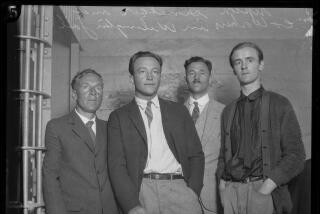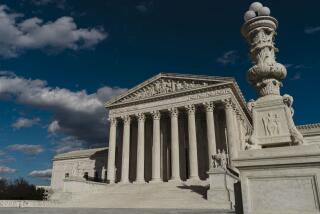John P. Frank, 84; Attorney Won Key Decision in 1966 Miranda Case
- Share via
You have the right to remain silent. Anything you say can and will be used against you in a court of law. You have the right to speak to an attorney, and to have an attorney present during any questioning. If you cannot afford a lawyer, one will be provided for you at government expense.
--Miranda rights
*
John P. Frank, the constitutional scholar, professor and lawyer whose defense of Ernesto Miranda before the U.S. Supreme Court helped etch those words into the vocabulary of arresting officers, ensuring the civil rights of all criminal suspects, has died. He was 84.
Frank, a staunch civil libertarian and key advisor in an earlier U.S. Supreme Court case mandating school desegregation, died Saturday in a Scottsdale, Ariz., hospital after a heart attack.
A prominent lawyer for 62 years, Frank wrote or delivered arguments many times before the high court. One client in the 1950s was the state of Arizona, which was trying to preserve its share of the Colorado River from “our great neighbor to the west [California] who is trying to get all the water in the river.” A 1970s client was the State Bar of Arizona, which was trying to block advertising by attorneys. Frank argued that advertising by a member of any profession was inherently deceptive, only to acknowledge a decade later that marketing was a necessity even for his well-known Phoenix firm of Lewis & Roca.
But Frank’s most famous client was Miranda, who was arrested in 1963 on charges of raping an 18-year-old woman. Picked out of a lineup, Miranda confessed, was convicted and was sentenced to 20 to 30 years in prison. The Arizona Supreme Court rejected his appeal.
The American Civil Liberties Union recruited Frank and his partner John J. Flynn, to take the case to Washington. Frank wrote the brief and told Flynn to argue it, adding: “This case will make your reputation. I’ve already argued before the Supreme Court.”
The Miranda decision written by Chief Justice Earl Warren and announced June 13, 1966, became a hallmark of the Warren court’s record of expanding individual rights. The court adopted Frank’s proposed standard requiring all law enforcement authorities to read suspects a list of civil rights that was already provided by the FBI.
The ruling was immediately vilified by several police officials and prosecutors and has been the subject of continuing debate and litigation. The Supreme Court upheld the decision in 2000.
Frank did not save Miranda, who was retried, convicted and given the same 20-to 30-year sentence minus the time he had already served. When he was released, he returned to the streets and died of knife wounds in 1976.
But Frank helped establish the legal requirement, which placed a printed card in police officers’ pockets so they would remember what to say.
“Miranda was a capstone to a vast cross-cultural pressure,” Frank said in 1986, “that led to law enforcement in this country becoming more civilized.”
After the decision was upheld two years ago, Frank told the Business Journal that he had originally agreed to take the case because: “I believe very earnestly that forced confessions are a very bad thing. The Constitution says no person should have to be a witness against themselves, and we obey the Constitution.”
Born in Appleton, Wis., Frank earned his undergraduate and law degrees at the University of Wisconsin and a graduate law degree from Yale. He clerked for U.S. Supreme Court Justice Hugo L. Black, about whom he wrote a 2000 biography, and he taught civil procedure at Indiana University and Yale.
It was during his teaching stint at Yale in the early 1950s that he was brought in as an advisor to the NAACP Legal Defense and Educational Fund, which was taking Brown vs. Board of Education before the Supreme Court.
Frank had written briefs in other key desegregation cases and became a major advisor on constitutional arguments for NAACP lawyer Thurgood Marshall.
Frank moved to Phoenix in 1954 to practice law, remaining a key consultant for civil rights lawyers across the country. He was an attorney for the Democratic Party of Arizona for 30 years, and an advisor on legal issues with nationwide political implications.
In 1969, Frank uncharacteristically defended conservative Judge Clement F. Haynsworth Jr. in Senate hearings when he was nominated for the court by President Nixon. Convinced that Haynsworth was innocent of accusations of conflict of interest, Frank called the 55-45 defeat of his nomination “legislative murder” and wrote a book in 1991, “Clement Haynsworth, the Senate, and the Supreme Court.”
Later, Frank opposed two Supreme Court nominations, testifying against Robert H. Bork in 1987 and advising Anita F. Hill during her testimony in the unsuccessful attempt to derail the appointment of Clarence Thomas during his 1991 confirmation hearings.
Frank’s 11 books also include “Lincoln as a Lawyer,” published in 1961, “Marble Palace: The Supreme Court in American Life” in 1958 and “American Law: The Case for Radical Reform” in 1969.
Aside from the law, Frank worked for desert conservation, traveled the world to hear opera and, according to his daughter Nancy Frank, “loved zoos, chocolate and flowers.”
Frank is survived by his wife of 58 years, Lorraine; five children, John of Jefferson, Wis.; Gretchen of Los Angeles; Andrew of San Diego, and Karen and Nancy of Oakland; and six grandchildren.
A memorial service is scheduled Saturday at the Phoenix Art Museum, where Frank served as a director for more than 30 years.
The family has asked that memorial donations be made to the Desert Botanical Garden, 1201 N. Galvin Parkway, Phoenix, AZ 85008, or the John Frank Lecture Series at Arizona State University, Tempe, AZ 85287.
More to Read
Sign up for Essential California
The most important California stories and recommendations in your inbox every morning.
You may occasionally receive promotional content from the Los Angeles Times.













